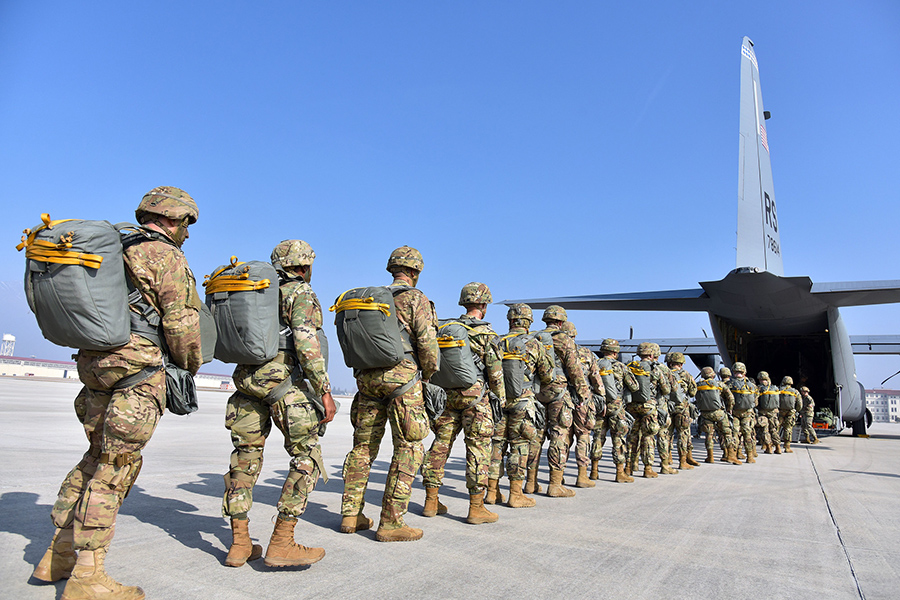Europe, Not NATO, Should Send Troops to Ukraine to Stop Russia's Advance

Just a few months ago, it would have been unthinkable for European leaders to suggest sending European troops to Ukraine. But now Europe has broken the taboo. French President Emmanuel Macron has repeatedly said that the deployment of European forces in Ukraine cannot be "ruled out". Since then, other European officials have joined him, writes Foreign Affairs.
Finland's defence minister and Poland's foreign minister have both suggested that their countries' forces could end up in Ukraine. These comments, combined with existing support for such measures in the Baltic States, show that there is a growing bloc of countries opens to direct European intervention in the war.
The idea of deploying European troops to Ukraine has provoked predictable reactions. Russia started its "nuclear blackmail" of Europe and the world again. Germany and the United States then backtracked and severely limited the assistance they had provided to Ukraine throughout the war, fearing that Russia might follow through on its threats of escalation. They also sharply criticised more specific European states for allegedly unnecessary provocations.
But European leaders have demonstrated that it is possible to break out of the one-sided escalation debate that has so far worked in Russia's favour. In the past, Moscow threatened escalation, and Berlin and Washington responded with words and actions aimed at de-escalation - a dynamic that kept both Germany and the United States from sending the more advanced missile systems that Ukraine desperately needs.
Now the threats are coming from Europe, and Russia is feeling extremely uncomfortable. Too many politicians and pundits in the United States and Europe are echoing Putin's talking points, warning that any outside intervention in Ukraine will lead to World War III.
In fact, sending European troops would be a normal response to such a Russian crime.
Russia's invasion has upset the regional balance of power, and Europe has a vital interest in seeing this imbalance redressed. The obvious way to do this is to provide a lifeline to the Ukrainian military, and Europe is a natural support.
A European force could conduct both non-combat and combat operations to relieve pressure on Ukraine. A purely non-combat mission would be the easiest to sell in most European capitals. A European force could relieve the Ukrainians of logistical functions, such as the maintenance and repair of combat vehicles.
By being west of the Dnipro River - the natural barrier that protects much of Ukraine from the Russian offensive - European troops would demonstrate that they are not there to kill Russian soldiers, pre-empting the inevitable accusations of European aggression against Russia.
Some Ukrainian equipment is already being sent to Germany, Poland and Romania for major repairs, but doing so closer to the front would speed up the process, reduce the time the equipment is out of action and free up more Ukrainian forces for combat missions.
French, Polish and other European military advisers could also provide lethal and non-lethal training in Ukraine to further enhance the professionalism of the Ukrainian military. If additional mobilisation expands the Ukrainian army next year - as seems likely - increased training capacity in Ukraine would be particularly useful.
Of course, European forces could do more than just repair and train. The most limited form of European combat missions could still remain west of the Dnipro and be defensive in nature.
One such mission could involve strengthening Ukrainian air defence capabilities in the region by deploying personnel, providing equipment, or even taking over command and control of the Ukrainian air defence system.
The risks of escalation would be minimal, as European forces would have little chance of killing Russian military pilots launching munitions into Ukraine from Belarusian and Russian airspace. But they would help shoot down cruise missiles and drones. Thus, European-led air defence batteries would free up more Ukrainian troops to protect forces near the front line, and thwart Russian attempts to destroy critical infrastructure and intimidate the Ukrainian population into surrender.
European troops could also carry out other defence and humanitarian tasks, such as demining and clearing unexploded Russian munitions. Handing over this work to Ukrainian personnel would help protect civilians and support Ukraine's economic recovery, as farmers now struggle to plant and harvest in fields full of mines and other unexploded ordnance.
Another combat role will be to patrol areas of Ukraine's border where Russian troops are not deployed, such as the Black Sea coast and the borders with Belarus and Transnistria (a separatist region of Moldova occupied for many years by Russian forces).
Securing these borders would free up more than 20,000 Ukrainian troops (and the weapons and ammunition they carry) to be deployed to the frontline. It would also reduce the likelihood of a new front opening along these borders.
European troops could also help secure Ukraine's three remaining Black Sea ports, which are vital to both the Ukrainian economy and global food security for Europe and the world.
The presence of European troops would boost the morale of the Ukrainian people and reassure them that their country's future lies in Europe. Finally, Europe should consider a direct combat mission to help defend Ukrainian territory west of the Dnipro River and Russian advances further into Europe.
After all, one of Russia's potential targets is Odesa, Ukraine's main port, through which most of the country's exports are shipped. If Russian troops approach the city, European forces in the vicinity would have the right to defend themselves by firing back at the advancing soldiers.
They could help thwart a Russian offensive that, given Odesa's strategic location, could strangle the Ukrainian economy and position Russian troops for a further invasion of Moldova.
Russia will try to portray any lethal response to a Russian attack as European aggression, but Russia itself will be responsible for any escalation.